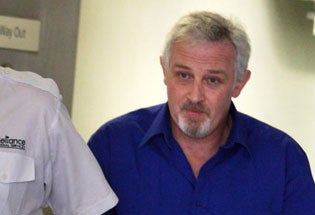Nat Fraser may face wife murder retrial

The family of a woman whose husband was convicted of murder even though her body was never found said they were "bitterly disappointed" today after he won an appeal.
Former fruit and vegetable seller Nat Fraser is facing a retrial after the UK's highest court ruled his 2003 conviction unsafe.
The Supreme Court in London said Fraser's lawyers had been denied access to evidence which could have made a "significant" difference to the outcome of his trial.
Fraser, 52, of Elgin, Moray, is serving a 25-year minimum term after being found guilty of murdering his estranged wife Arlene by a jury in Edinburgh.
Mrs Fraser, 33, vanished from her home on April 28, 1998.
Fraser appealed, arguing at a Supreme Court hearing in March that prosecutors had breached his right to a fair trial under the European Convention on Human Rights.
A panel of five Supreme Court justices unanimously agreed and upheld Fraser's appeal today.
But the panel said judges in Scotland must decide whether Fraser's conviction should be quashed and whether he should face a re-trial.
Scottish prosecutors said they would seek a re-trial.
"We have noted the Supreme Court's decision," said a Crown Office spokeswoman. "The Crown will now seek authority to bring fresh proceedings against Nat Fraser for the murder of his wife Arlene."
In a statement, Mrs Fraser's family said: "Today's decision by the Supreme Court is bitterly disappointing.
"We accept today's decision. However, we fully support the Crown's intention to seek authority to bring fresh proceedings against Nat Fraser for Arlene's murder."
No decision has yet been taken on whether Fraser, who failed in an appeal to the Appeal Court in Edinburgh three years ago, should be freed on bail pending a re-trial.
The Supreme Court said part of the prosecution evidence was that Mrs Fraser's rings were found in the bathroom of her house on May 7, 1998.
Prosecutors suggested that Fraser had removed them from her body and placed them in the bathroom to make it appear that she had "decided to walk away".
But, the judges said, it later emerged that prosecutors had evidence from police to suggest the rings were in the house on the night Mrs Fraser vanished.
Fraser argued that the failure by the prosecution to reveal that information to his legal team infringed his right to a fair trial under Article 6 of the European Convention on Human Rights.
"The court holds that the trial would have been significantly different if the undisclosed evidence had been available," said one judge, Lord Hope, in today's ruling.
"There is a real possibility that the evidence would have been sufficient to raise a reasonable doubt as to whether (Fraser) placed the rings in the bathroom on May 7.
"If that were so, the jury's verdict would have been bound, in view of the judge's direction, to have been different."
Subscribe to Independent Premium to bookmark this article
Want to bookmark your favourite articles and stories to read or reference later? Start your Independent Premium subscription today.
